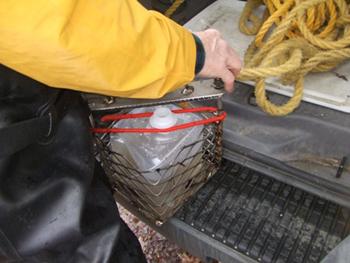Experts tangle over whether fracking waste is making drinking water unsafe
River water from this jug will be tested for bromides, which can create carcinogenic compounds when combined with chlorine in drinking water. (Photo by Ann Murray for Allegheny Front.)
Experts continue to disagree over whether fracking is causing earthquakes in Ohio, but there’s one thing experts are sure of.
Before Pennsylvania’s fracking waste was pumped into the Ohio wells in question, much of it ended up in Pennsylvania’s rivers and streams. On that, everyone agrees. Pennsylvania officials thought they’d stopped that by banning fracking waste from water treatment plants. And they may have. But for some reason, the levels of a chemical byproduct of fracking in the rivers is not decreasing. The chemical, in certain circumstances, can even become hazardous to people’s health. Why it’s in the river, though, no one seems to agree.
Frank Blaskovich manages the Wheeling, W.Va., water treatment plant. His job is to take water from the Ohio River and make it into safe drinking water for his city of 30,000. But since 2008, the Ohio has been too salty — because it’s been contaminated by fracking waste. So he’s had to dilute it with groundwater from backup wells, and that costs money.
“The price of water will eventually go up which probably will lead to a possible rate hike,” he said.
But there’s another, perhaps more sinister problem with the polluted water: it has high levels of bromide. By itself, bromide is a harmless salt. But when mixed with chlorine, a necessary additive to make the water safe for drinking, it transforms into chemicals called trihalomethanes. Long term exposure to trihalomethanes increases the risk of bladder and other cancers. Wheeling and dozens of other cities in western Pennsylvania and West Virginia have been breaking EPA regulations to limit exposure to trihalomethanes for three years.
“That’s when deep drilling for gas sort of took off up in this area of the country,” he said.
Each deep gas well produces millions of gallons of salty water. The water is full of bromides. Until recently, drillers in western Pennsylvania trucked it to wastewater plants for disposal. The plants removed metals and other pollutants, but not bromides. That requires expensive new technology.
The plants would release the “treated” water — bromides and all — back into rivers and streams. That was fine until March, when the EPA noticed the steadily rising levels of trihalomethanes. A month later, the state’s Department of Environmental Protection asked drillers to stop sending wastewater to treatment plants.
Drillers say they are recycling more of their water now, or sending it to Ohio, where it’s injected into deep storage wells. And some say causing earthquakes, but that’s a story for a different day.
If drillers are sending much less of their salty water to treatment plants, bromide levels in the rivers should be going down. But, at least this year, that hasn’t been the case.
“We thought in such a wet year, we would see almost no bromide, it would be below our detection limit in most of our samples, and it was not,” said Jeanne Van Briesen, a Carnegie Mellon scientist who’s monitored the Monongahela River for the past two years.
Stanley States, director of water treatment at Pittsburgh Water and Sewer Authority, has been trying to figure that out. He regularly draws water samples from the Clarion River in Elk County, which eventually winds its way to his water treatment plant.
“Source-water protection is part of what we’re supposed to do as drinking water people; our treatment doesn’t begin at the plant, it begins up in the river system,” he said.
As he samples, he’s mapping areas with the highest levels of bromides. He’s found that power plants increase levels of bromides, for example, but that’s not the biggest source.
“It’s pretty clear the only places where there’s significant increases in bromides are downstream of these industrial waste water plants,” he said.
Van Briesen , the Carnegie Mellon scientist, said it’s too soon to say that fracking is the definitive cause of these hot spots. Wastewater from conventional oil and gas drilling — the kind that’s been produced in Pennsylvania for decades, could also be a source, she said.
“Almost anything to do with fossil fuel production has the potential to contain amounts of bromide,” she said.
For now, people are left to debate whether it was fair to ban fracking wastes from industrial water treatment plants. Plant operators say know. Environmental experts say every little bit helps.
In the spring, the EPA will tighten its standards for trihalomethanes and water treatment plant operators are nervous they’ll have to tell their customers that the water they’re drinking no longer meets the standards set in the Safe Drinking Water Act.
“They’re going to want answers,” States said.
Like who’s going to get the bromides out of the water. That, for now, remains a mystery.
